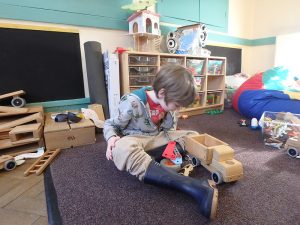About four and a half years ago I did a thought experiment. What would an ideal school look like? I envisaged a place where children were cherished and respected by adults and peers alike, where they had the space to pursue their own goals without coercion or pressure to conform to an arbitrary and ever shifting set of standards. I imagined a place where the primary goals were to promote good mental health, confidence and a sense of community, and academic performance was something that was left to naturally blossom as a result. It was a nice idea, but one I quickly shrugged off as unattainable. Schools like that just don’t exist in the real world. Or do they?

At the time I was a home educating parent with three young children. Having had some bad experiences of school myself, I had decided never to force my children into a system that had made me feel anxious and voiceless, but without a car and on a very low budget our options to take part in the home educating community were limited and for much of the time we felt somewhat isolated.
My idea of a better system of schooling was rudimentary at best and not something I gave much further thought to. Soon afterwards came a difficult pregnancy followed by a year of anxiety when my baby failed to thrive, a very painful family bereavement, family members in and out of hospital, and finally another unexpected bereavement. By last October I felt that home education was no longer a viable option for my family. My children had very different and conflicting needs and I felt stretched almost to breaking point. I just couldn’t continue on my own anymore but how could I find a solution that would work for everyone?
About the same time I heard about the opening of EKS and being prompted by my ten year old decided to look into it as an option for my family. After discussions with Kezia (one of the founders) and attending an introductory meeting I realised that we shared a lot of values in common. I began reading up on democratic education and applied to join the EKS staff team. I was delighted to be accepted and my children began to attend in January.
 Five weeks in people have asked me whether EKS was as I had imagined it and I have to answer both yes and no. Yes because I am seeing children flourish in ways I have never seen before in any other setting. No because the ways in which this has happened have surpassed my expectations. Students are enthusiastically taking on responsibilities in the running of the community. They are learning how to resolve their differences in a fair and respectful way. They are coming up with their own initiatives and following their goals with an inspiring tenacity. They are excited about going to school in the mornings. I have been told about one child kissing the building goodbye because he is so happy here.
Five weeks in people have asked me whether EKS was as I had imagined it and I have to answer both yes and no. Yes because I am seeing children flourish in ways I have never seen before in any other setting. No because the ways in which this has happened have surpassed my expectations. Students are enthusiastically taking on responsibilities in the running of the community. They are learning how to resolve their differences in a fair and respectful way. They are coming up with their own initiatives and following their goals with an inspiring tenacity. They are excited about going to school in the mornings. I have been told about one child kissing the building goodbye because he is so happy here.
Others who have spent time in other schools have described how they feel genuinely respected and valued by staff for the first time. One of my children, who was initially anxious about joining the community, slotted in immediately and has not once objected to going. Another, who I was concerned might not fit into the community because he has SEN has thrived in the ability to go at his own pace without pressure to conform to academic or social pressures that make no sense to him. He enjoys taking part in the democratic process and even though some of his proposals have been a little obscure (such as the infamous “no pigs should be allowed, in case they eat all the food”) I have been delighted to see the way the system genuinely treats everyone as equals regardless of age and neurodiversity. Everything is open to debate and rather than being shut down for being “too weird” or impractical, these proposals are discussed in a serious and sensible way and he is slowly learning, without any condescension or patronisation, how the system works and what may or may not be considered by the majority to be a good and implementable proposal.
The best thing I have learned so far is that sometimes what seems impossible can become a reality with a little bit of faith and the dedication to see it through. I don’t think the students at this school will take as long to learn this lesson as I did.

